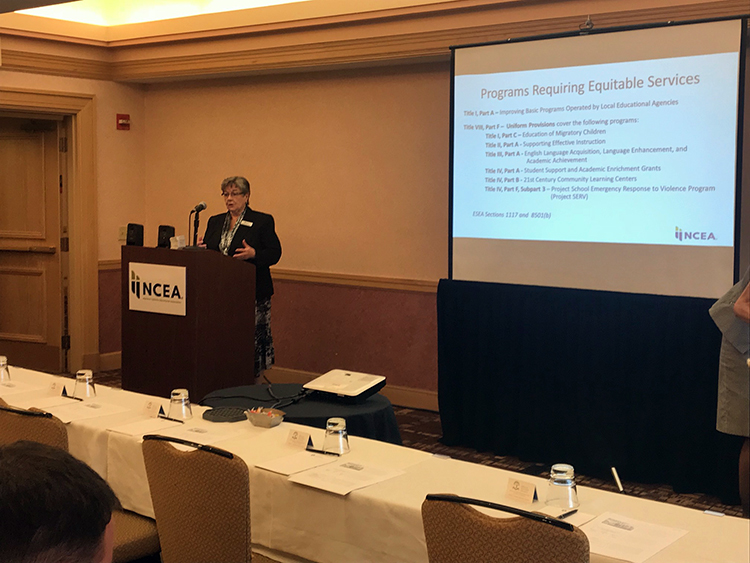
The following blog was contributed by Dale McDonald, PBVM, Ph.D., NCEA Director of Public Policy. She will be presenting “Effectively Implementing ESSA: What Catholic School Officials Should Know and Do” at the 2019 NCEA Institute for Catholic School Leaders (ICSL 2019), July 14-17 in Indianapolis. SAVE the DATE!
ICSL 2019 is an engaging professional development opportunity for principals, aspiring principals, presidents, pastors and board members. The preliminary program can be reviewed at www.NCEA.org/icsl. Registration is now open!
Why leave educational dollars on the table when knowledge of best practices in dealing with local school districts would provide services to students and teachers that ESSA makes available to them? – Dale McDonald
The equitable participation of students and teachers in federal education programs was established in 1965 in the Elementary and Secondary Education Act (ESEA) when Congress determined that federal education aid should be directed toward assisting all students, regardless of the type of school they attend. This child benefit theory allows Catholic school students, teachers and other educational personnel to receive secular, neutral and non-ideological services under a variety of programs in ESSA. The significant gains in terms of more equitable participation of private school students, teachers, administrators and other educational personnel in the benefits afforded under the Every Student Succeeds Act (ESSA) will be realized only if Catholic school leaders are aware of what benefits are available and how they may be accessed most effectively.
It is important that Catholic school leaders understand the legislative and regulatory prescriptions for obtaining maximum benefits for students and teachers and are able to communicate best practices for obtaining equitable ESSA benefits and using them to enhance the teaching and learning process. The Every Student Succeeds Act provides greater opportunities for our students to improve their learning outcomes and many professional development opportunities for teachers and other educational personnel to improve learning environments and acquire skills and knowledge to improve instructional practices to support those student outcomes. The law is clear about all that is available: now diocesan and school leaders must make the most of the opportunities presented and engage in timely and meaningful consultation with the local school districts to claim those benefits for their students and teachers.
My presentation at the 2019 NCEA Institute for Catholic School Leaders will explain the significant changes that ESSA provides to No Child Left Behind that provide more equitable services for Catholic school students and teachers. Participants will learn about new opportunities offered in ESSA and changes to NCLB that greatly enhance services for our students and teachers. We will review the applicable Title programs and how to maximize access to them. Since the consultation process with the public school district directly affects the participation of students and teachers, we will review the legal requirements for engaging in timely and meaningful consultation and what leaders can do to assure that funds generated by private school students are spent for their benefit. Come and learn and share best practices for maximizing the equitable services benefits available under the Every Student Succeeds Act.
About the Author

Dale McDonald, PBVM, Ph.D. is Director of Public Policy for the National Catholic Educational Association. In that capacity she serves NCEA and its members in policy analysis and advocacy regarding the national education policy issues impacting Catholic schools. Sr. McDonald collaborates with lobbyists for Catholic and private education associations to advance their interests in legislative activities on Capitol Hill and with the U.S. Department of Education, White House Domestic Policy Council and other federal agencies regarding education policy issues that impact private schools. Sister has been a presenter at numerous conferences and workshops on educational policy issues and is a regular political columnist for Momentum, has been published in several national and international journals, contributed to the Handbook of Research on Catholic Education and the Encyclopedia of American Catholic Education and publishes NCEA’s annual Statistical Report on Schools and Staffing. Sr. McDonald has a Ph.D. in Educational Administration from Boston College, an M.S. in Educational Administration from Pace University, an M.A. in American History and a B.S. in Elementary Education from Fordham University.